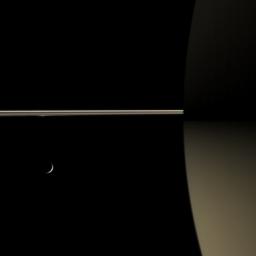
|
Saturn’s Night Colors
- Click the image above for a larger view
- Full-Res JPEG (1016 x 1016) (24.8 kB)
- Full-Res TIFF (1016 x 1016) (3.1 MB)
Caption:
This rare color view of Saturn's night side shows how the rings dimly illuminate the southern hemisphere, giving it a dull golden glow. Part of the northern dark side is just visible at top -- the illumination it receives being far less than the south.
The unlit side of the rings is shown here. The portion of the rings closest to Cassini is within the dark shadow of Saturn; the bright distant portion is outside the planet's shadow.
A crescent Tethys (1,071 kilometers, or 665 miles across) appears below the rings at left.
Images taken using red, green and blue spectral filters were combined to create this color view. The images were taken with the Cassini spacecraft narrow-angle camera on April 2, 2006, at a distance of approximately 3.8 million kilometers (2.4 million miles) from Saturn and 3.5 kilometers (2.2 million miles) from Tethys. The image scale is about 23 kilometers (14 miles) per pixel on Saturn.
Background Info:
The Cassini-Huygens mission is a cooperative project of NASA, the European Space Agency and the Italian Space Agency. The Jet Propulsion Laboratory, a division of the California Institute of Technology in Pasadena, manages the mission for NASA's Science Mission Directorate, Washington, D.C. The Cassini orbiter and its two onboard cameras were designed, developed and assembled at JPL. The imaging operations center is based at the Space Science Institute in Boulder, Colo.
For more information about the Cassini-Huygens mission visit http://saturn.jpl.nasa.gov/home/index.cfm . The Cassini imaging team homepage is at http://ciclops.org .
Cataloging Keywords:
| Name | Value | Additional Values |
|---|---|---|
| Target | Saturn Rings | Saturn, Tethys |
| System | Saturn | |
| Target Type | Ring | Planet, Satellite |
| Mission | Cassini-Huygens | |
| Instrument Host | Cassini Orbiter | |
| Host Type | Orbiter | |
| Instrument | Imaging Science Subsystem (ISS) | |
| Detector | Narrow Angle Camera | |
| Extra Keywords | Color, Shadow, Visual | |
| Acquisition Date | ||
| Release Date | 2006-05-11 | |
| Date in Caption | 2006-04-02 | |
| Image Credit | NASA/JPL/Space Science Institute | |
| Source | photojournal.jpl.nasa.gov/catalog/PIA08176 | |
| Identifier | PIA08176 | |
